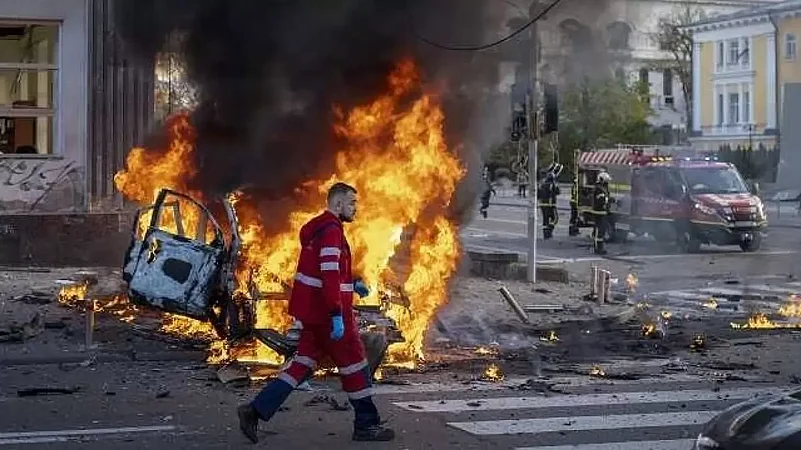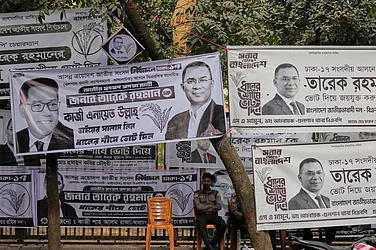Ukrainian troops have retaken seven villages spanning 90 square kilometres from Russian forces in the past week, the deputy defence minister said Monday as the early stages of Kyiv's counteroffensive notched small successes.
Deputy Defence Minister Hanna Maliar wrote on Telegram that the Ukrainian flag was again flying over the village of Storozhov, in the eastern Donetsk province, and that her troops had also retaken three other nearby small villages and three in neighbouring Zaporizhzhia province.
"The battles are tough, but our movement is there, and that is very important," President Volodymyr Zelenskyy said in his nightly video address.
He added that rainy weather is challenging his troops, and that he's discussed with his military commanders "which points of the front we need to strengthen and what actions we can take to break more Russian positions".
On Sunday, Ukrainian officials said their troops took the Donestk villages of Blahodatne, Makarivka and Neskuchne -- south of the town of Velyka Novosilka. Maliar reported Monday that the Zaporizhzhia province settlements of Lobkove, Levadne and Novodrivka were also now back under Ukrainian control.
Russian officials did not confirm Ukraine's gains, which were impossible to verify and could be reversed in the to-and-fro of war. The gains amounted to only small bits of territory and underscored the difficulty of the battle ahead for Ukrainian forces, who will have to fight metre by metre to regain the roughly one-fifth of their country under Russian occupation.
Recent fighting on the western edge of the 1,000-kilometre frontline has been complicated by a dam breach that sent floodwaters into a part of the Dnieper River separating the two sides.
Western analysts and military officials have cautioned that an effort to rid Ukraine of entrenched and powerfully armed Russian troops could take years, and the success of the Ukrainian counteroffensive is far from certain.
French President Emmanuel Macron said in Paris that the Ukrainian counteroffensive began several days ago and "is set to be deployed over several weeks, if not months".
Vladimir Rogov, an official with the Moscow-appointed administration of the Zaporizhzhia region at the western end of the front line, said "heavy battles" were raging in the area Monday involving Russian artillery, mortars and air power.
The villages are part of an area where the Russian front lines jut out into territory held by Ukraine. While just a few kilometres deep, the protrusion has recently become one of several epicentres of intense fighting along the front line that cuts across southern and eastern Ukraine.
Despite their small size, the capture of the villages involved an incursion into the first line of Russian defences and could allow Ukrainian forces to try a deeper thrust into occupied areas.
Russian forces control far less Ukrainian land than they did before a blistering Ukrainian counteroffensive last year that retook the northern city of Kharkiv and southern city of Kherson, among other places.
On Saturday, Zelenskyy said "counteroffensive, defensive actions are taking place" without specifying whether it was the all-out counteroffensive that has long been expected. A day earlier, Russian President Vladimir Putin asserted that the counteroffensive had started and Ukrainian forces were taking "significant losses".
Ukrainian forces have focused on the Zaporizhzhia region and an area near the devastated Donetsk city of Bakhmut, among other locations.
Russian authorities have said their troops are largely holding their ground.
But Semyon Pegov, a prominent Russian military blogger who goes by the nickname WarGonzo, acknowledged Russian troops had withdrawn from Blahodatne, Neskuchne and Makarivka, and said Ukrainian forces were trying to push forward along the banks of the Mokri Yaly River on Monday.
Alexandet Kots, military correspondent for Russian daily Komsomolskaya Pravda, said Ukrainian forces were attempting to advance, despite heavy losses, toward the town of Staromlinovka, which sits on a strategic highway leading to the port city of Mariupol. Russian forces captured the city over a year ago.
Separately Monday, the Ukrainian Defence Ministry said at least four civilians were killed and 16 others wounded by Russian shelling over the last 24 hours.
In Donetsk, Russian shelling hit nine towns and villages and left one civilian dead and two others wounded. Donetsk Governor Pavlo Kyrylenko posted images of apartment buildings and a cultural centre damaged by Russian strikes in the town of Avdiivka.
In Kharkiv, Russian forces pummelled several settlements with artillery, mortar and rocket fire, wounding at least three people, regional state administration chief Oleh Synehubov wrote on Telegram.
The reported Ukrainian advance came as authorities on both sides of the front line pressed on with rescue and relocation efforts for civilians in the Kherson region driven from their homes by flooding from the breach of the Kakhovka dam last week.
With many homes and shops submerged in polluted river water, the UN and other aid groups say access to fresh drinking water is crucial and that waterborne diseases pose a big risk. Thousands of people have been evacuated, though some remain.
Kherson Governor Oleksandr Prokudin said Monday that water levels have been receding. More than 32 towns and villages remain flooded, he said, and Russian forces have continued shelling inundated areas held by Ukraine on the river's western bank.





















